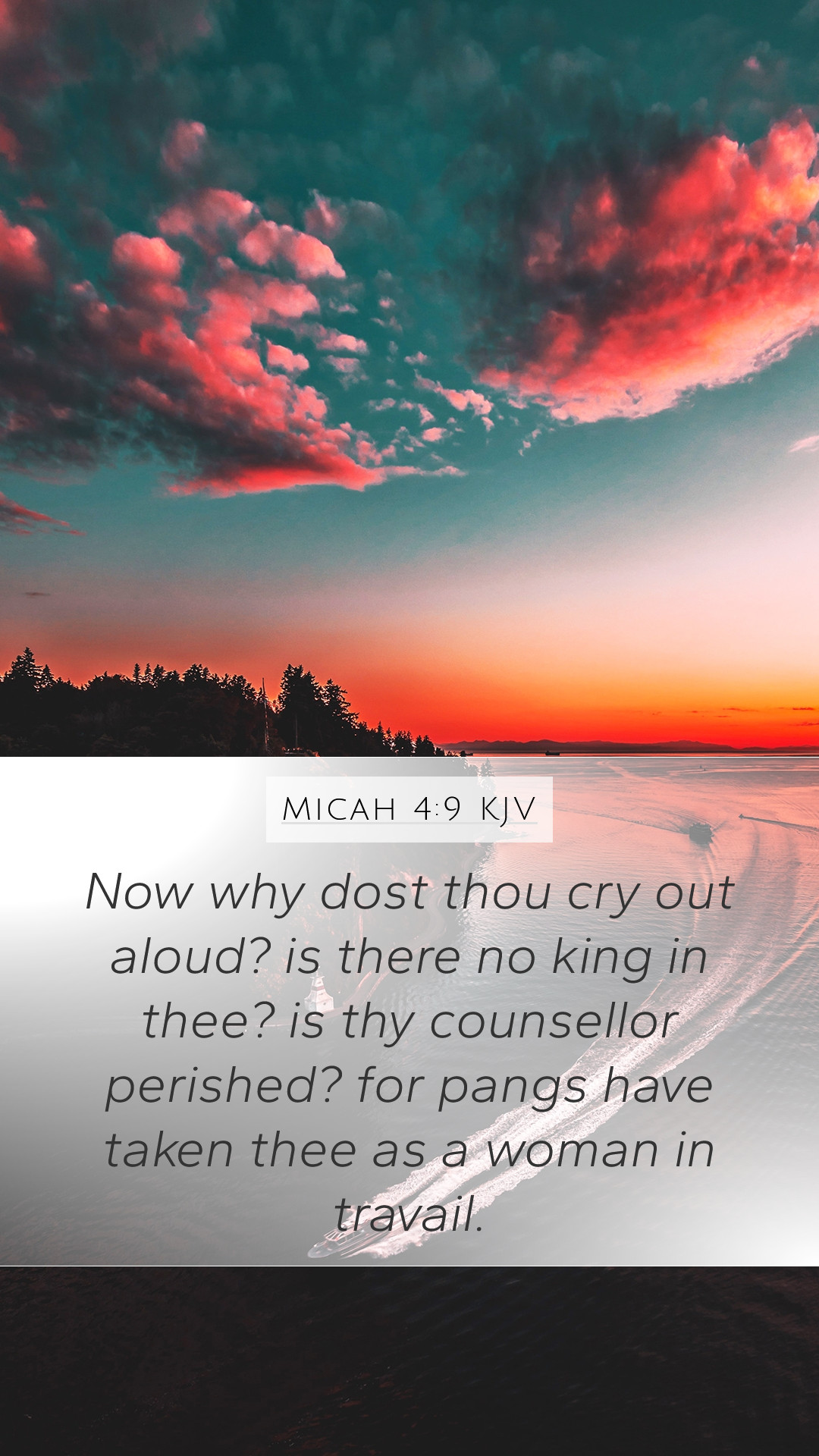Old Testament
Genesis Exodus Leviticus Numbers Deuteronomy Joshua Judges Ruth 1 Samuel 2 Samuel 1 Kings 2 Kings 1 Chronicles 2 Chronicles Ezra Nehemiah Esther Job Psalms Proverbs Ecclesiastes Song of Solomon Isaiah Jeremiah Lamentations Ezekiel Daniel Hosea Joel Amos Obadiah Jonah Micah Nahum Habakkuk Zephaniah Haggai Zechariah MalachiMicah 4:9 Meaning
What is the meaning of Micah 4:9?
Now why dost thou cry out aloud? is there no king in thee? is thy counsellor perished? for pangs have taken thee as a woman in travail.
Micah 4:9 Bible Verse Meaning
Bible Verse Meaning: Micah 4:9
Verse: Micah 4:9 - "Now why dost thou cry out aloud? Is there no king in thee? Is thy counsel perished? For pangs have taken thee as a woman in travail."
Overview
The book of Micah addresses the people of Israel with warnings, prophecies, and the hope of restoration. Micah 4:9 specifically captures the emotional and spiritual state of the nation of Israel during a time of distress.
Bible Verse Interpretations
This verse raises probing questions that highlight the turmoil the people were experiencing. According to Public Domain Commentaries, such as those by Matthew Henry, Albert Barnes, and Adam Clarke, the verse serves as both a lament and a call to reflection.
- Matthew Henry: He explains that the "crying out" signifies deep distress and despair due to oppression or invasion. The questions posed signify that without a king (leadership) and wise counsel, the people are likened to a woman in labor, in agony and helplessness.
- Albert Barnes: Barnes views this as a depiction of the people's loss of hope and leadership. The absence of a king indicates a lack of guidance and stability. His insights emphasize that true leadership involves providing counsel, protection, and governance that ultimately reflect God's authority.
- Adam Clarke: Clarke integrates a historical perspective, suggesting this might refer to the times of invasions and the loss of sovereignty, leading to a spiritual vacuum. The imagery of childbirth is significant, denoting both pain and eventual deliverance, reinforcing the idea that pain may precede restoration.
Key Themes
- Leadership: The absence of a king points to the necessity of good governance. Without spiritual and civic leadership, chaos ensues.
- Distress and Crying Out: The call depicts the heart of the people who, amidst their troubles, are expressing their anguish to God.
- Symbolism of Labor Pains: The analogy of a woman in travail suggests that out of suffering, new life or restoration can emerge.
Bible Study Insights
For those engaging in Bible study groups or online Bible study, this verse provides profound insights for understanding the implications of leadership within one's spiritual life and community.
Significance in Biblical Context
The verse is critical in reflecting the struggles faced by God’s people and the assurance that eventually, God’s promises will prevail even through hardship.
Related Bible Cross References
- Isaiah 26:17-18: Compares Israel’s pain to that of a woman giving birth, highlighting the theme of suffering leading to something new.
- Jeremiah 30:6: Addresses the picture of labor pains as a metaphor for Israel's suffering and restoration.
- Hosea 13:13: Relates to the pain of Israel, showing the connection to the nation's trouble due to lack of fidelity to God.
Conclusion
Micah 4:9 serves as a poignant reminder of the struggles faced by God’s people due to poor leadership and spiritual waning. The reading invites deeper Bible verse explanations and encourages believers to seek God's counsel in times of distress. By applying Bible study tools and resources, individuals can gain a greater understanding of Scripture and reflect on the meaning of Bible verses in their daily lives.


